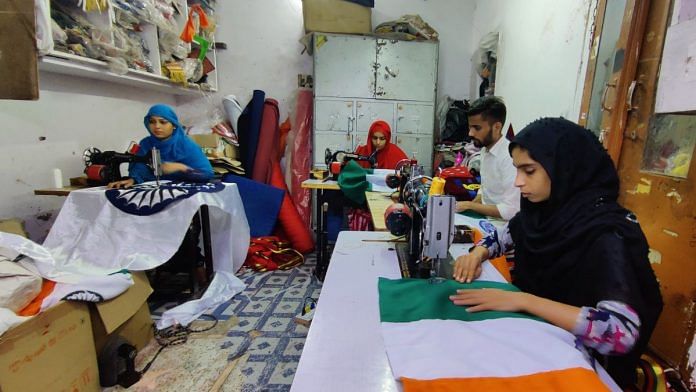Amid the maze of bricked lanes in the Sunami Gate area, a patriotic song plays in the backdrop as 42-year-old Nahida Noor sews the national flag on the veranda of her home. The intricate movement of her hands and the focus in her sparkling eyes show that her work goes beyond mere tailoring expertise.
“This is not a common tailoring job that I am doing by sewing these tricolours,” she says. “I feel proud doing this work as I know that the national flags sewn by me will flutter on homes across the nation on Independence Day.” She will also unfurl the national flag atop her house in the Malerkotla town of Punjab.
“I prioritise the making of tricolour over any other work as this initiative (Har Ghar Tiranga campaign) has come as a boon for us. We are now able to earn more,” added Noor. She is being helped by her 20-year-old daughter, who completed class XII three years ago and is now learning to stitch from her mother. “We get Rs 15-20 per piece and I am able to make 45-50 pieces a day,” says Noor.
For the past 15 days, many women like Nahida, who come from impoverished homes in the sleepy, Muslim-dominated Punjab town of Malerkotla, are working round the clock to complete their orders. While many prefer to work individually, others work in groups.
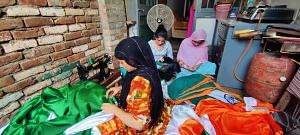
“There are at least 1,800-2,000 women, mostly Muslim, who are engaged in the work of making the tricolour. Most of them are working from their home,” said Mohammed Naseem, owner of NN Embroidery unit, which deals in flags and badges. It is Naseem who hires these women to make tricolours by providing cloth. There are fewer men engaged in the stitching of national flags compared to women.
Also Read: Tricolour vs bhagwa dhwaj — display pix row revives RSS’ ‘troubled’ relationship with tiranga
The booming flag business of Malerkotla
Nestled between Patiala and Ludhiana, Malerkotla, with its population of nearly 1.35 lakh, is Punjab’s newly formed 23rd district. According to the 2011 census, Muslims make up 68.5 per cent of its total population.
Known for its intricate embroidery work and skilled artisans, Malerkotla is home to many small-scale units that deal in ceremonial flags, insignia and badges for the Indian Army and security forces. The demand is especially high this year.
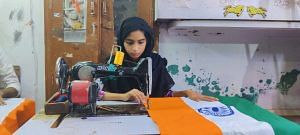
“Earlier there was some demand for national flags around Independence and Republic Day as military and security forces placed orders, this time the demand for the national flag has soared significantly. We used to make 500-600 flags in the year, but this year we have already made 1.5 lakh flags,” said Naseem.
Other women are also grabbing this opportunity.
“I have been able to make nearly 20 flags a day since the announcement of the Har Ghar Tiranga campaign and I work overtime to earn more,” said 28-year-old Reshma, who works at one of the units. She added that many women in her neighbourhood are now employed in this line of work.
“We got in touch with the units and brought raw material home. I stitch and weave Ashoka Chakra with embroidery on the flags. More than anything, it is a proud moment for us that we have got an opportunity to serve the nation in some way,” said 32-year-old Shukriya, who has mastered the art of hand-embroidering national emblems.
It is easy to witness the festive spirit in these congested lanes. Despite being knee-deep in work, the women happily coordinate on individual levels to produce top-quality flags. And they do this without the assistance of self-help groups (SHGs).
“We contacted some SHGs for making national flags. Since most of them were busy catering orders for cloth bags after a ban on single-use plastic, women interested to work on flags coordinated on an individual basis,” said Gurmeet Kumar, assistant commissioner, Malerkotla.
Also Read: How do Muslims celebrate Independence Day? The many loyalty tests since Nehru
Patriotism trumps profit
Traders say that increased demand for flags has also led to a spike in the price of raw materials. “The flags are made up of terry cot, satin and khadi cloth. Recently, the prices of these fabrics have shot up due to several factors,” said Tinkle Goyal, a local cloth trader.
But for many, patriotism trumps profit.
“This time it is not about profits. Our profit margins have decreased due to costly raw material, but we are happy to contribute to our nation. I do not charge a penny from the locals when they ask for a flag for their homes,” said Naseem.
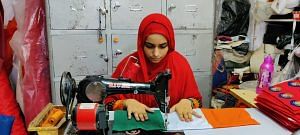
This demand, though, extends beyond the packed bylanes of Malerkotla. “National flags made by us are going to Jammu and Kashmir, West Bengal, Delhi, Haryana, Goa, Assam and Uttar Pradesh. I have so far delivered more than 1 lakh flags,” said Tahir Rana, the owner of another flag and badge manufacturing unit.
Rana said that his unit deals in flags via the Government e-Marketplace (GeM) portal. But for others like Naseem, orders are delivered through a contractor who coordinates with public and private organisations.
The flags are made in various sizes—2×3 square feet for houses, 6×4 square feet for government offices and 8×12 square feet for hoisting on big poles. The prices of these flags vary on the basis of painting and embroidery. While an embroidered flag (6×4 feet) is priced at Rs 290, the cost of a screen-painted one is Rs 190.
Unbeknownst to most, tailors use Chinese sewing machines to embroider the Ashoka Chakra on most flags.
The complicated single-thread embroidery costs more when done by hand.
“Nobody would prefer paying more for embroidery when an economical option is available. Due to decreasing demand for hand-made embroidery, artisans have also started switching from the skill,” said Shukriya.
Also Read: Har Ghar Tiranga: Department of Posts sells over 1 crore national flags in 10 days
What it means for women
The women of Malerkotla are increasingly finding their voice—and autonomy—in this profession. And this is especially true for school dropouts. “I stitch flags too,” said 19-year-old Sunaina, who dropped out of school after the eighth standard.
“I studied till the fifth standard before professionally pursuing sewing,” added Reshma.
But the script is slowly changing. Increased financial independence is allowing mothers to educate their daughters. “Earlier many of us used to drop out of school after the eighth standard. But now we make sure our daughters complete Class XII or at least X,” said Rani, while packing flags for dispatch.
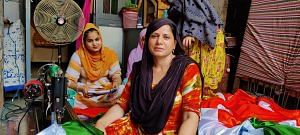
Some mothers prefer the ‘safety’ that comes with this work. “My daughter has completed school and now helps me with household work. We prefer her to not work outside home,” said Nahida Noor, while her daughter helped finish the freshly stitched flags.
“Most of the women, especially Muslims in Malerkotla do not pursue higher education due to economic, social and cultural factors. But now times are changing,” said Dr Mohammad Rafi, senior vice-chairman for the State Commission for Minorities, Punjab.
“Now there are almost five colleges in Malerkotla due to which Muslim women are getting the opportunity to complete their education,” added Rafi.
Jagat Kathurea, district president of the Bharatiya Janata Party (BJP), Malerkotla, said that Muslim artisans of the area are known for their embroidery skills.
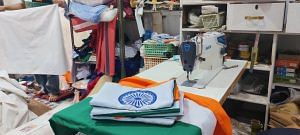
“We are happy that the Har Ghar Tiranga campaign has helped generate employment and artisans are moving over Hindu-Muslim divide to make national flags,” said Kathurea.
Aam Aadmi Party (AAP) MLA Dr Mohammad Jamil Ur Rahman has also extended support to the Har Ghar Tiranga campaign. The state government is planning to engage such skilled workers in SHGs and providing further monetary help, he quipped.
(Edited by Zoya Bhatti)


